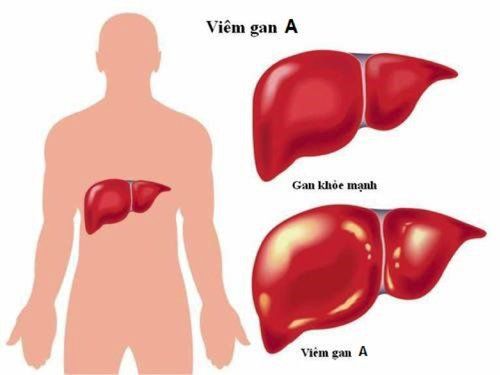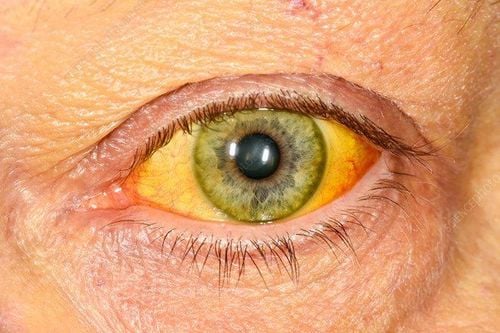This is an automatically translated article.
The article was consulted with Specialist Doctor I Vo Thi Thuy Trang - Department of Medical Examination & Internal Medicine - Vinmec Da Nang International General Hospital.Viral hepatitis is divided into three main types and all of them affect the patient's liver in varying degrees. Some symptoms of different types of hepatitis will be similar, but the treatment for each type will be different.
1. Hepatitis A
Hepatitis A occurs in the body when you accidentally eat or drink something that contains the virus. Hepatitis A is highly contagious and can be passed from person to person in a variety of settings, as well as through food or water. Food is at risk of being contaminated if a hepatitis patient touches it after going to the bathroom without washing their hands. Small amounts of infected feces were transferred to food and spread the disease. Raw seafood, fruits, vegetables, and undercooked foods are also common culprits in hepatitis A outbreaks. The virus can also spread in daycare centers if teachers don't carefully wash their hands after changing a baby's diaper.The main risk factor for hepatitis A is traveling to or living in a country with a high infection rate. Then eating raw food or drinking tap water can increase the risk of disease.
This type of viral hepatitis is a mild illness that will not lead to infection or lasting damage. The disease usually does not cause any symptoms or complications. The virus almost always disappears on its own, your liver will automatically heal in about 2 months if you live in moderation and reasonably. You can prevent getting the disease by getting the hepatitis A vaccine as recommended.

Viêm gan A do virus
2. Hepatitis B
You can get hepatitis B if:Have sex with someone who already has it; Sharing dirty needles and syringes with drug addicts; Direct contact with the blood or body fluids of an infected person. Most hepatitis B patients recover in about 6 months. Sometimes, the condition also causes long-term infections and leads to liver damage. An infected person is capable of transmitting the virus even if they have not yet noticed any symptoms. Vaccination is the most effective way to prevent hepatitis B.
Note, pregnant women with hepatitis B can transmit the disease to the fetus. Therefore, the baby infected from the mother should be treated and followed up within the first 12 hours after birth.
Although there is an effective vaccine, hepatitis B is still the main cause of chronic hepatitis, cirrhosis and liver cancer in humans. According to statistics at the hospital, for every 1,020 cases of liver disease, hepatitis B accounts for nearly 50%. At the same time, the rate of cirrhosis and liver cancer caused by hepatitis B is also at the top.

Dùng chung bơm kim tiêm với người mắc viêm gan B
3. Hepatitis C
Many hepatitis C patients do not have any symptoms. About 80% of people with the disease have a long-term infection. Hepatitis C can lead to cirrhosis, or the formation of scar tissue in the liver. Importantly, there is currently no vaccine to prevent this type of viral hepatitis.Like hepatitis B, you can get hepatitis C by sharing needles or by coming into contact with the blood and fluids of a patient that contains the virus. You are also at risk for hepatitis C if you have sex with an infected person, but this is less common.
Prior to the introduction of blood screening protocols in 1992, people who had received blood transfusions during this period were at risk of hepatitis C infection. However the blood used in transfusion today is very safe. All blood is pre-tested to make sure it doesn't carry the hepatitis B or C virus.

Hiện nay chưa có vắc-xin phòng viêm gan C
4. Symptoms and complications of viral hepatitis
The most common symptoms for all three types of viral hepatitis are:Dark urine; Stomachache; Yellowing of the skin or eyes; Pale or clay colored stools; Fever but not high; Loss of appetite; Tired; Feeling sick to your stomach; Lack of nutrition. In addition, people with hepatitis B may also experience joint pain. See your doctor as soon as possible if you have any of the symptoms listed above.
In general, among the types of viral hepatitis, hepatitis B and C are the most dangerous because after the acute stage, the disease can progress to chronic hepatitis, cirrhosis, primary liver cancer... These complications greatly affect the health, quality of life as well as the economy of patients.

Vàng da vàng mắt là triệu chứng điển hình của viêm gan
5. Treatment of viral hepatitis
5.1. Hepatitis A If you have hepatitis A, your doctor will continue to monitor how your liver works, but there is no cure for Hepatitis A. The vast majority of cases of healthy people carrying the disease do not need drug treatment, just a reasonable diet, rest and work. Specifically:Do not do heavy work; Do not eat indigestible, greasy foods that are harmful to the liver; Especially do not drink beer, alcohol, smoke... 5.2. Hepatitis B The groups that need treatment must follow the instructions and supervision of the doctor. Currently there are many drugs used to treat, but need to be prescribed by a specialist who also monitors the accompanying tests which are quite expensive and time consuming. There are several medications used for long-term treatment of hepatitis B including:
Adefovir (Hepsera); Entecavir (Baraclude); Interferon; Lamivudine (Epivir HBV); Telbivudine (Tyzeka); Tenofovir (Viread).

Người bệnh điều trị viêm gan cần thuận thủ phác đồ của bác sĩ
Elbasvir-grazoprevir (Zepatier); Glecaprevir-pibrentasivir (Meefret); Ledipasvir-sofosbuvir (Harvestoni); Ombitasvir-paritaprevir-ritonavir-dasabuvir (Viekira Pak); Simeprevir (Olysio); Sofosbuvir (Sovaldi); Sofosbuvir/velpatasvir (Epclusa). Chronic hepatitis B and C are the leading causes of liver cancer. Vaccination against hepatitis A and B, early testing, proper monitoring and treatment can help prevent and reduce the risk of cirrhosis and liver cancer. In addition, everyone needs to build a healthy lifestyle, practice safe sex, and lead a moderate and reasonable lifestyle to reduce the risk of viral hepatitis infection for themselves and the community.

Phòng bệnh viêm gan A, B bằng cách tiêm chủng vắc-xin càng sớm càng tốt
Evaluate the liver's ability to work through liver enzyme tests; Evaluation of bile function; vascular nutrition; Early screening for liver cancer; Perform tests such as Total blood cell analysis, blood clotting ability, screening for hepatitis B, C Assessment of hepatobiliary status through ultrasound images and diseases that are at risk of affecting liver disease/treating liver disease. more severe liver disease In-depth analysis of parameters to evaluate hepatobiliary function through laboratory and subclinical; the risk of affecting the liver and early screening for hepatobiliary cancer.
Please dial HOTLINE for more information or register for an appointment HERE. Download MyVinmec app to make appointments faster and to manage your bookings easily.
Reference source: Webmd.com












